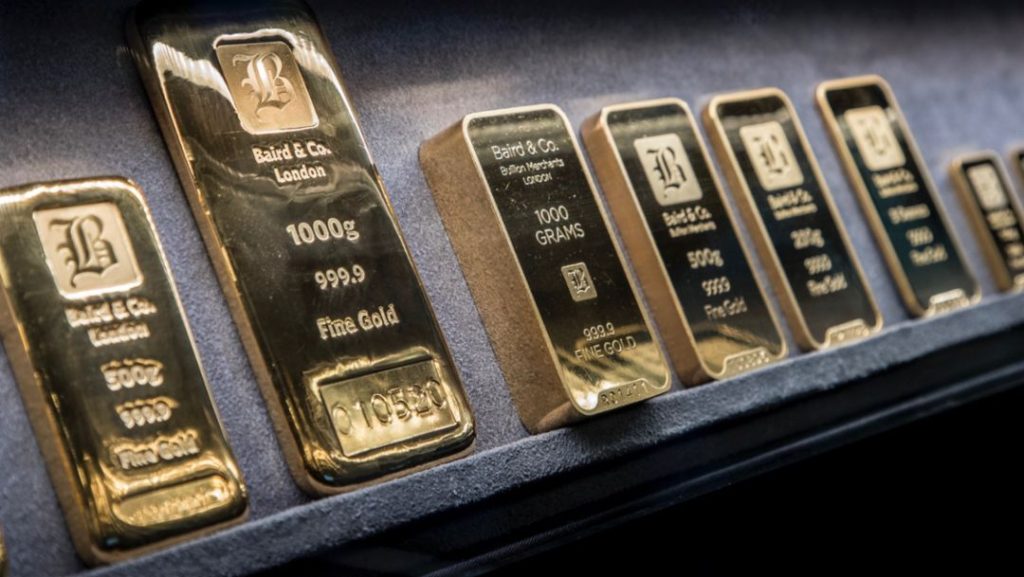
Physical gold
Trading physical gold involves buying and selling gold in its physical form, such as gold bars or coins. This type of trading is often seen as a long-term investment and is popular among individuals who want to own a tangible asset as a store of value or hedge against inflation.
That said, trading physical gold can be expensive due to the costs associated with storage, transportation and insurance. It also requires a significant upfront investment to purchase it, which may limit accessibility for some traders. As such, physical gold trading is more suited for investors with a long-term outlook.
You can trade gold bars and coins through various avenues, including reputable precious metal dealers. Some online platforms provide opportunities for buying and selling physical gold, allowing convenient access to the market.
Four bullion banks
The key market players are four banks: JPMorgan, HSBC, ICBC Standard, and UBS. With the exception of UBS, the key bullion banks have their own vaulting facilities.
In addition, there are a further seven market makers that hold bullion accounts with one of the four banks. These are: BNP, Citibank, Goldman Sachs, Merrill Lynch, Morgan Stanley, Toronto-Dominion, and Standard Chartered. This makes up the major participant bullion banks within the LBMA (London Bullion Market Association).
Investing in physical gold has a number of advantages

- Investors have the option of keeping their investment in tangible form. They might be in the shape of decorations, bars, or coins. As a result, it is one of the safest investments.
- Gold investments may help preserve your wealth from inflation and depreciation.
- Having actual gold on hand allows investors to determine when to purchase and sell. The asset is the responsibility of the investor. As a result, the investor has total control.
Analysis and evaluation of the Full Corporate Offer to buy physical gold
The Full Corporate Offer (FCO) is the gold standard for buying physical gold. It is a complete document with all relevant information for the buyer. Such an FCO is what a Swiss banker would require and recommend as documentation.
However, in the private to private gold trade it is unreasonable to consider this as the minimum standard to start negotiations. This relates, first of all, to the requirement to include in this initial document the name, business address and proof of identity of the participants, including the sellers’ fiduciary agent and ultimate beneficial owner, if any.
With respect to the commodity, form, weight, purity, and even age are relevant. The buyer needs to know the origin, current location, and ideally the full chain of ownership. A Safe Keeping Receipt (SKR) and Certificate of Deposit (COD) or similar documentation should be provided. Other documents include assay reports and other commodity certificates. Ownership certificates should also be included.
Delivery procedure and documentation
Delivery may be based on Incoterms FOB, CIF or otherwise. Export requirements, delivery procedures and documentation, and finally the mechanism for transfer of title should also be included in the offer.
The gold price offered may be fixed or index-linked. Currency, minimum order and discount schedule, as well as the expected commission are other relevant pricing details.
The payment procedure may include prepayments and performance bonds, SWIFT or similar procedures, and, if applicable, source of funds requirements that the seller may impose on the buyer.
Special terms and the period of validity of the offer to purchase are the final components of the offer. If the document does not qualify as an FCO, it is a Soft Corporate Offer (SCO), which may also be a reasonable approach to begin serious negotiations.
Risk management through a controlled execution of the cross-border gold transaction
Serious and professional buying and selling of physical gold in an international environment follows specific steps. Some of these deal elements are required by regulatory frameworks, others are simply out of tradition or convenience. The Full Corporate Offer FCO as important milestone in getting the deal done is sometimes referred to as an FCO-S for “Full Corporate Offer to Sell” and FCO can also be interpreted as a Firm Corporate Offer.
While the Soft Corporate Offer (SCO) is non-binding and in many cases sanitized (i.e., the seller’s identity is not disclosed), the properly prepared FCO names horse and rider and, if accepted, has the character of a binding term sheet for the acquisition of gold. In a further step, its contents become part of a final Gold Sale & Purchase Agreement (SPA). An incomplete or formally invalid FCO may be reclassified as an SCO.
The FCO is highly relevant for gold transactions that are governed by Swiss procedures. This is especially the case for Swiss-linked transactions. However, many international companies have the policy and corporate governance to voluntarily follow these Swiss procedures. In such cases, an FCO is required to issue a buyer’s Letter of Intent (LOI).
Seven golden requirements by the buyer’s side

It can never be ruled out that the gold purchase contract is illegal under local law and, therefore, invalid and unenforceable. As a consequence, a sensible seller will always understand that the buyer must take appropriate steps to verify this. A contractual warranty by the seller is obviously not sufficient in this respect. Illegal gold contracts are often unenforceable in local courts. Advance payments may not be recoverable.
Many countries have regulations in place for the sale and export of gold to ensure proper governance, prevent illegal activities, and promote transparency in the mining sector. Typically, this results in the following seven requirements:
- Licenses and permits from the appropriate government mineral authorities to engage in gold mining and selling activities.
- Formal business and tax registration with the appropriate government agencies, and compliance with all relevant registration requirements.
- Compliance with mining laws and regulations, which govern various aspects of mining activities, including licensing, environmental protection, health and safety standards, and community engagement.
- Payment of applicable taxes, royalties, and fees related to gold mining, trading, and export.
- Documentation and record-keeping of accurate records of gold production, purchases, sales, and exports. This might include keeping track of the origin and chain of custody of the gold to demonstrate its legality.
- Obtaining the necessary export permits from the relevant government agencies, the use of official export declaration forms and a central reserve bank approval for foreign exchange transactions
- Compliance with regulations related to anti-money laundering and anti-corruption measures. This may involve conducting due diligence on business partners and customers, implementing proper record-keeping procedures, and reporting suspicious transactions
In order to obtain a sufficient level of clarity in this regard, a review of official or other web sites will not be sufficient. Instead, a formal legal opinion from a reputable local law firm is proper and appropriate. Such a legal opinion must either be provided by the seller or has to be obtained by the buyer on his own.

